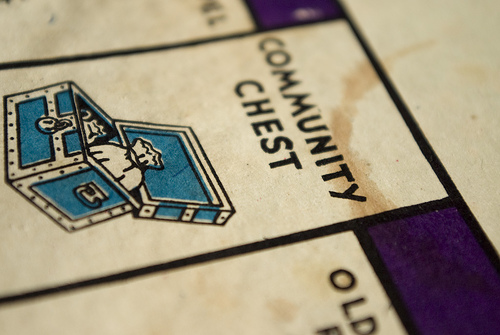A famine amongst plenty
Homelessness and the demand for social housing are both rising rapidly in Ireland. Meanwhile, an estimated 100,000 properties lie vacant around the country. Paul Walsh looks at possible solutions to a housing crisis in the making.
Homelessness is unquestionably, and worryingly, on the rise in our capital city. In early September, the Dublin Simon Community released figures showing the number of people availing of their services was up 27.5% in 2010 over 2009 figures. The group provided services to 2,532 individuals in 2010 and increased the number of emergency beds provided per night to 169. Their rough sleeper count in Dublin city centre for November 2010 was 60. However, they say that this figure is an underestimation, as it does not take into account people in squats, couch surfing or sleeping rough in parks. According to their annual report there are approximately 2000 people in the greater Dublin area classified as homeless.
Social Housing and the ‘new poor’
The increase in homelessness has been mirrored by an increased requirement for social housing. Figures provided by the Irish Council for Social Housing (ICSH) reveal that the number of families on the social housing list as at March 2011 was 98,318 - a massive increase from 56,249 in 2008. According to Karen Murphy of the ICSH there are a number of factors for this huge increase in demand.
“It has been three years since the last count and in that time the recession took hold and unemployment spiralled. The biggest increase was in the affordability category - 67% -which demonstrates that people are unable to pay for their own accommodation. 78% of people on the list earn less than €15,000 per annum.”
The recession and spiralling unemployment has created what a number of voluntary organisations are calling the ‘new poor’ – or people who have fallen into poverty due to unemployment and debt following Ireland’s economic collapse. St. Vincent De Paul recently came to the assistance of a man who had ended up living in a car for four months, after falling into financial difficulties. He had developed a serious alcohol problem after he lost his job and had been asked by his wife to leave the family home. Given the number of mortgages in distress or arrears across the country, it is likely more and more people will find themselves categorised as the ‘new poor’. According to the most recent Central Bank statistics, almost 56,000 homeowners were at least three months behind their mortgage repayments at the end of June. That’s more than 7% of the total 777,000 outstanding private residential mortgages. The report also reveals that almost 96,000 mortgage holders are either in arrears or have had their loans restructured.
 Vacant properties and Nama
Vacant properties and Nama
Another set of figures reveal a possible solution for the growing housing crisis. At the launch of their 2010 report, Dublin Simon Community chief executive Sam McGuinness described the housing situation in Ireland at present as a “famine amongst plenty”. He gave a figure of 23,000 as the estimated number of vacant properties in Dublin alone. Savills Ireland estimated a much lower figure of 5,400 in a report released on 28 September.
Either way, there is strong evidence that properties are lying vacant while people sleep on the streets and others languish on housing lists. Looking at the situation countrywide, CSO figures published in June showed that on the date of the census there were 294,202 vacant properties throughout the country. This was only a preliminary report so we do not have the breakdown of, for example, how many holiday homes are included in this figure. However, it is suggested that we have an oversupply of around 100,000 vacant properties.
Nama holds a significant percentage of the vacant stock of housing in this country. So, should Nama provide housing to the long-term homeless and those on social housing lists? Well there is a precedent – just this week Education Minister, Ruairi Quinn suggested that homes owned by Nama be offered to attract overseas academics and researchers. If Nama properties are being offered as accommodation for academics earning large salaries, surely Minister for Housing and Planning, Willie Penrose should be making similar appeals for those on less than €15,000 a year who require homes.
Joan Collins, People before Profit TD for Dublin South Central is one politician who has made just such an appeal. She says, “I tabled a motion in Dublin City Council at the end of last year advocating that Nama properties be taken over by Local Authorities as social or affordable housing to attempt to resolve the housing crisis. This should be the priority - not offering these properties to attract oversees academics and researchers.”
In a keynote speech he gave at the ICSH Biennial Social Housing Conference, Penrose acknowledged the innovative approach of the voluntary housing sector in delivering new housing through the “utilisation of Nama stock”. Karen Murphy of the ICSH confirmed that the sector has begun working with Nama.
“There has been one project over the line so far – Beacon South Quarter – where 58 apartments were purchased. The ICSH expects that there will be further co-operation with Nama and other projects progressed.”
This future interaction with Nama will be significantly influenced by the fact that Government policy has moved away from the traditional capital and acquisition model for provision of social housing, to be replaced by long-term leasing from the private market. Given that the budget for social housing provision for 2011 was cut by €300 million - or 36% - it could be argued that this decision was made on the basis of budgetary pressures. However, given the number of vacant properties held by Nama, could this change of policy be politically motivated? Is this switch to long-term leasing as the main tool to provide social housing yet another bailout for developers?
Murphy is unsure if the move is politically motivated as “the department is adamant that this scheme was already in train” before the property market collapsed. We were told that Nama was not created as a bailout for developers. This was exposed for the lie it always was recently when developer Harry Crosbie appeared on RTÉ’s Saturday Night Show. He admitted that he will pay Nama back what they paid the banks for the loan, rather than the original amount he borrowed. This policy - which a Nama spokesperson confirmed - reveals that Nama is based on the notion that some developers - just like some banks - are too big to fail.

Simple solutions, complex problems
By contrast with the ease with which those who have contributed the most to this economic crisis have consistently accessed assistance since its beginning, voluntary organisations have to fight hard even to just get their message heard. Brendan Dempsey, a regional president with charity St. Vincent de Paul, has suggested some simple cost neutral measures to help those in housing difficulty. These include the payment of fuel allowance to those on social welfare and low incomes biannually rather than weekly, to assist with budgeting. He also makes strong recommendations about moneylenders: “We have a situation in the country where moneylenders are allowed charge people 183% interest, sucking the last drop of blood out of families. I’m calling on the Government to change the law and bring that down to about 20%. That would cost the taxpayer nothing and it would give people breathing space.”
Paula O’Brien of the Dublin Simon Community is also calling on the Government to take steps that require short-term investment but which she says will result in long-term savings.
“Currently there is a large spend on emergency accommodation, which is very expensive, so down the line if appropriate accommodation is provided for those who need it, with support, there undoubtedly will be some cost savings. However we are working with people who have absolute needs in a context where risk factors are on the increase, and we are supplementing statutory funding to ensure that those who are the most vulnerable in our society get the support and services they need. A focus on prevention and early intervention would also result in long-term cost savings – if the vulnerable can be reached before they reach the stage of becoming homeless, the requirement to access expensive state services and intervention could be avoided.”
For those in the negative equity and mortgage arrears trap, their hope was that the new Government would come to their aid. In April of this year Enda Kenny hinted that he was considering debt forgiveness for some struggling homeowners. The Government commissioned the Department of Finance to investigate what could be done. The resulting Keane Report, published on 12 October, has left many disappointed. There will be no debt forgiveness for homeowners. The report proposes a ‘mortgage-to-rent’ scheme whereby homeowners in extreme distress, and who qualify for social housing, will pay social housing rent but with the house ownership reverting to the bank or local authority. Trade-down mortgages are also recommended, whereby homeowners in negative equity sell their current home and move to a smaller place with a smaller mortgage, but carry any negative equity with them and continue to pay it off.
The reaction to the report has been mixed, with David Hall of homeowners advocacy group New Beginnings calling it “a banker’s solution, to solve a problem for banks in the banker’s interest”.
So what is the alternative, given that any debt forgiveness scheme for homeowners will require further funding from the state? David McWilliams, speaking on Newstalk about the report, suggested that debt forgiveness would be possible, but would require the Government negotiating with the ECB for debt burden sharing with European banks. The EU and ECB have stated categorically that Ireland must pay the debts of its banks in full, just like our Government are insisting mortgage holders have to pay our banks in full. It is clear that radical proposals are required by our Government as the link between mortgage arrears, social housing needs and homelessness means that what is a problem now could very soon become a crisis. {jathumbnailoff}
Images: Doun Dounell, HBuzacott, woodleywonderworks.
